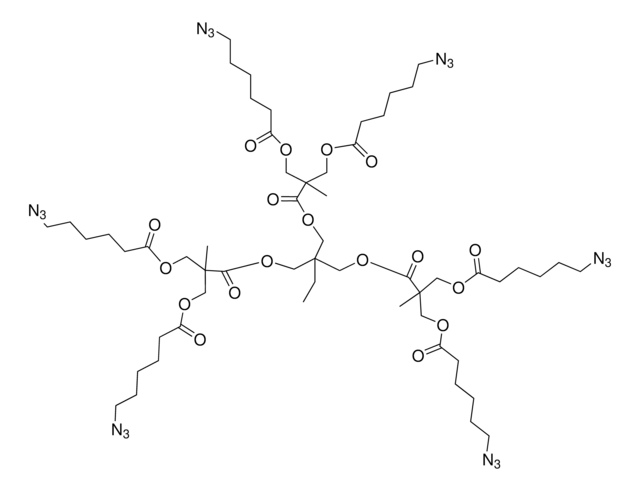910805
mPEG12-hydrazide
average MN 650 (by NMR), chemical modification reagent carboxyl reactive, hydrazide, methoxy
Synonym(s):
Methoxy-PEG-HZ, Polyethylene glycol, mPEG-Hydrazide
About This Item
Recommended Products
Product Name
mPEG12-hydrazide,
description
Ω-end: Hydrazide
α-end: methoxy
form
solid or liquid
mol wt
average Mn 650 (by NMR)
reaction suitability
reagent type: chemical modification reagent
reactivity: carboxyl reactive
color
colorless to white
Ω-end
hydrazide
α-end
methoxy
polymer architecture
shape: linear
functionality: monofunctional
storage temp.
−20°C
Related Categories
Application
Storage Class Code
11 - Combustible Solids
WGK
WGK 3
Flash Point(F)
Not applicable
Flash Point(C)
Not applicable
Regulatory Listings
Regulatory Listings are mainly provided for chemical products. Only limited information can be provided here for non-chemical products. No entry means none of the components are listed. It is the user’s obligation to ensure the safe and legal use of the product.
JAN Code
910805-500MG:
910805-VAR:
910805-BULK:
Choose from one of the most recent versions:
Certificates of Analysis (COA)
Don't see the Right Version?
If you require a particular version, you can look up a specific certificate by the Lot or Batch number.
Already Own This Product?
Find documentation for the products that you have recently purchased in the Document Library.
Articles
CRISPR/Cas9 delivery via nonviral nanoparticles shows promising advancements for gene editing in disease treatment.
Our team of scientists has experience in all areas of research including Life Science, Material Science, Chemical Synthesis, Chromatography, Analytical and many others.
Contact Technical Service






